Have you ever found yourself craving the delicate, buttery taste of raw scallops? As seafood enthusiasts ourselves, we understand the allure of indulging in these oceanic delicacies. However, before you take a dive into this culinary adventure, it’s essential to consider whether eating raw scallops is safe or not.
While many people enjoy consuming raw seafood, there are potential health risks associated with doing so. Raw scallops can harbor harmful bacteria and viruses that can cause foodborne illnesses if not prepared correctly or sourced from reputable suppliers.
So, is it worth taking the risk for the sake of taste buds’ satisfaction? Let’s explore the topic further and find out if we can indulge in our favorite seafood dish without jeopardizing our health.
Key Takeaways
- Raw scallops can harbor harmful bacteria and viruses that can cause foodborne illnesses.
- Cooking scallops thoroughly reduces the risk of illness.
- Cross-contamination can occur when preparing raw scallops on a cutting board or with utensils that were previously used for other meats without proper cleaning.
- Anyone with a weakened immune system should avoid consuming raw seafood altogether.
Understanding the Risks of Eating Raw Seafood
Before you indulge in raw scallops, it’s crucial to understand the potential dangers lurking beneath their delicate exterior. Eating raw seafood comes with its share of risks, including the possibility of contracting foodborne illnesses.
Seafood safety is especially important because many types of fish and shellfish can carry harmful bacteria, viruses, and parasites that can make you seriously ill. When it comes to scallops specifically, there are a few things to keep in mind.
While they are delicious when prepared properly, consuming them raw increases your risk of bacterial infections such as Vibrio or Salmonella. This is because these types of bacteria thrive in warm water where scallops are often harvested from.
Additionally, if the scallops were not properly handled or stored before consumption, they could be contaminated with harmful pathogens. So while raw scallops may seem like a tasty treat, it’s important to prioritize your health and opt for cooked versions instead.
Potential Health Risks of Raw Scallops
Although consuming uncooked scallops may result in gastrointestinal illness, some people still prefer to indulge in this delicacy. It’s important to note that raw scallops can contain harmful bacteria like Vibrio and Salmonella, which can cause serious health issues.
Here are some potential risks associated with eating raw scallops:
- Cooking methods: If not cooked at the right temperature or for the appropriate duration, harmful bacteria may remain in the meat of the scallop.
- Contamination sources: Scallops harvested from contaminated waters or handled improperly during transportation can also lead to foodborne illnesses.
- Personal risk factors: Individuals with weakened immune systems, pregnant women, and young children may be more susceptible to contracting a foodborne illness from raw seafood.
- Cross-contamination: Preparing raw scallops on a cutting board or with utensils that were previously used for other meats without proper cleaning could result in cross-contamination and increase the risk of food poisoning.
- Allergic reactions: Some people may have an allergic reaction to raw scallops.
To reduce these risks, it is recommended to cook scallops thoroughly before consuming them. Proper cooking methods include grilling, baking, sautéing, or broiling until they reach an internal temperature of 145°F (63°C).
Additionally, make sure to purchase fresh and high-quality scallops from reputable sources and store them properly at home. By taking these precautions, you can enjoy your favorite shellfish without putting your health at risk.
Factors That Affect the Risk of Illness
To reduce your risk of illness from consuming raw scallops, there are several factors you need to consider.
The first factor is seafood sourcing. It’s important to make sure that the scallops come from a reputable source and have been handled properly. This means that they should be kept at the right temperature and not exposed to any contaminants that could cause illness.
Another important factor is cooking techniques. If you’re planning on eating scallops raw, it’s essential to ensure that they’re fresh and haven’t been sitting around for too long. However, if you prefer cooked scallops, make sure they are cooked thoroughly until the internal temperature reaches at least 145°F (63°C). This will help kill any harmful bacteria that may be present in the scallops.
By considering these factors when consuming scallops, you can minimize your risk of getting sick while still enjoying this delicious seafood delicacy!
Best Practices for Selecting and Preparing Raw Scallops
When it comes to enjoying the delicate flavors of scallops in their raw form, there are a few key tips and tricks that can help ensure your experience is like diving into the ocean on a summer day.
First and foremost, it’s important to source your scallops from a reputable seafood market or supplier. Look for scallops that are shiny and firm with no discoloration or odor. If possible, opt for ‘dry’ scallops rather than those that have been treated with phosphates, which can affect their texture and flavor.
Once you’ve sourced your scallops, it’s time to prepare them for consumption. One popular method is to marinate them in citrus juice or vinegar for a short period of time before serving raw. This not only adds flavor but also helps to ‘cook’ the outer layer of the scallop, reducing any potential risk of illness. Just be sure not to marinate them for too long as this can affect their texture.
With these best practices in mind, you can safely enjoy the deliciousness of raw scallops without any worries!
Alternatives to Raw Scallops
If you’re looking for a new way to indulge in the ocean’s bounty, there are plenty of delicious alternatives to try. While raw scallops may be a popular delicacy, there are many flavorful dishes that feature cooked scallops as the star ingredient.
From seared scallops with garlic butter and lemon to creamy scallop risotto, there’s no shortage of cooked scallop recipes that will satisfy your seafood cravings. One classic dish is Coquilles Saint-Jacques, which features sautéed scallops in a creamy cheese sauce topped with breadcrumbs and broiled until golden brown. Another tasty option is grilled scallops with a spicy marinade made from chili flakes, soy sauce, and honey.
Whatever your tastes may be, there’s sure to be a cooked scallop recipe out there that will make your taste buds dance with delight!
When to Seek Medical Attention
You don’t want to be caught in the deep end without a life jacket, just like you don’t want to ignore any potential symptoms after consuming scallops. While most people can enjoy raw scallops without any issues, there are some risks involved with consuming them that cannot be ignored.
If you experience severe abdominal pain, vomiting, or diarrhea after eating raw scallops, it’s important to seek medical attention immediately. Symptoms to watch for include nausea, vomiting, and stomach cramps or pain. In some cases, you may also experience fever and chills.
Prevention tips for raw seafood consumption include making sure that the seafood has been properly stored and handled before being consumed. It’s also recommended that anyone with a weakened immune system should avoid consuming raw seafood altogether as they’re at a higher risk of developing infections from bacteria such as Vibrio or Salmonella.
Remember, prevention is key when it comes to keeping yourself safe from any potential foodborne illnesses associated with consuming raw seafood!
Frequently Asked Questions
What is the nutritional value of raw scallops?
When it comes to health benefits, raw scallops are a great source of protein, vitamin B12, and omega-3 fatty acids. As for preparation methods, they can be enjoyed in various dishes like ceviche or sushi rolls.
Can raw scallops be frozen and still be safe to eat?
Yes, raw scallops can be safely frozen using the proper freezing technique. Thaw them in the fridge before cooking to avoid bacterial growth. Cooking tips: sear them quickly on high heat for a delicious treat!
What is the shelf life of raw scallops?
Scallop spoilage can occur quickly if proper storage techniques aren’t followed. Raw scallops should be refrigerated at 32-39°F and consumed within 1-2 days of purchase to ensure optimal freshness.
Are there any cultural dishes that use raw scallops?
Did you know that sushi rolls and ceviche are two cultural dishes that use raw scallops? They’re both delicious, but make sure to only eat them at reputable restaurants. Safety first!
How do I properly store raw scallops at home?
When it comes to Proper Scallop Storage, we recommend keeping them in a sealed container on ice. As for Scallop Preparation Techniques, ensure they are cleaned thoroughly and cooked to the appropriate temperature before consuming.
Conclusion
So, is it safe to eat raw scallops? The answer is not a straightforward one.
While some people may enjoy the taste and texture of raw scallops, there are potential health risks associated with consuming them. Raw seafood can contain harmful bacteria and viruses that can cause foodborne illnesses.
However, this doesn’t mean you need to avoid scallops altogether. By following best practices for selecting and preparing raw scallops, such as purchasing from reputable sources and storing at proper temperatures, you can reduce your risk of illness.
Additionally, if you’re unsure or uncomfortable with eating raw seafood, there are plenty of cooked alternatives available.
In conclusion, while raw scallops may be a tempting treat for some seafood lovers, it’s important to understand the potential risks involved. By being informed about these risks and taking necessary precautions when handling and preparing them, you can still enjoy the flavor and benefits of this delicious shellfish without putting your health in jeopardy.
So, go ahead and indulge in some scallop ceviche or sushi rolls – just make sure to do so safely!




